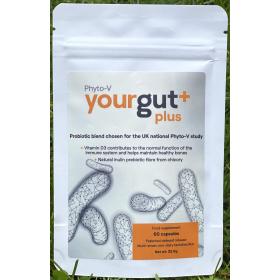Yourgut+ is was developed in May 2020 for the UK national Covid-19 dietary intervention study. It contains a unique blend of 5 different butyrate producing lactobacillus probiotic bacteria. Each capsule has 10 times the natural bacteria as a large live yogurt supported by an effective prebiotic soluble fibre inulin.
It aims to help restore a healthy gut flora with an emphasis on safety. It uses a patented slow release capsule which help avoid digestion of the bacteria by the stomach and help the bacteria research the large bowel where they are most needed.
The probiotic formula provides a natural, non-dairy source, live product.
Each capsule provides a minimum of 5 billion bacteria from 5 different strains.
Soluble fibre inulin is included a natural prebiotic to enhance colony formation in the large bowel
Patented slow release capsules vegetarian capsulesA Randomised, Double-Blind, Placebo-Controlled Trial Evaluating Concentrated Phytochemical-Rich Nutritional Capsule in Addition to a Probiotic Capsule on Clinical Outcomes among Individuals with COVID-19—The UK Phyto-V Study
1Bedfordshire Hospitals NHS Trusts, Bedford Hospital, Kempston Road, Bedford MK42 9DJ, UK2Addenbrooke’s Cambridge University Hospitals NHS Trusts, Hills Road, Cambridge CB2 0QQ, UK3Institute of Sport and Physical Activity Research (ISPAR), Bedford Campus, University of Bedfordshire, Polhill Avenue, Bedford MK41 9EA, UK4Department of English, The Old Schools, Trinity Lane, Cambridge University, Cambridge CB2 1TN, UK*Author to whom correspondence should be addressed.Abstract Gut microflora dysbiosis affects the majority of individuals after COVID-19, contributing to both gastro-intestinal (GI) and non-GI symptoms. Natural phytochemicals have reported anti-viral properties and favourable effects on inflammatory and oxidative pathways, both important for tissue damage post-viral pneumonia. This study involved 147 participants with symptomatic COVID-19, randomised to receive a placebo (P) or a phytochemical-rich concentrated food capsule (PC) in addition to a pre/probiotic lactobacillus capsule. Participants taking the PC had an almost two-fold reduction in mean fatigue scores compared to P [p = 0.02], a three-fold reduction in cough score and more than a double improvement in overall well-being scores [p = 0.02]. Two (1.5%) participants reported mild, increased bloating which they felt was attributable to the capsules, although GI symptoms improved in 25 of 31 participants (82%) who reported them at baseline. Sedentary, older, previously hospitalised men with GI symptoms had a statistically significantly improvement among those given the probiotic. Although some participants with early disease would have improved spontaneously, such a rapid improvement observed in the majority of participants, who had been suffering for an average of 108 days, was clinically relevant and welcomed, especially among those more likely to have pre-existing gut dysbiosis. We are now evaluating whether this blend could also enhance antibody titres post-COVID-19 vaccination.Introduction:Following COVID-19 infection, genetic variabilities in both the host and virus, along with co-morbidities, reduce an individual’s ability to sustain the viral assault and influence the severity of disease [1,2,3]. In addition, emerging data is linking worse outcomes with factors associated with less-favourable gut microflora (dysbiosis) [1,2,3]. Gut dysbiosis can cause impaired gut wall integrity, reduced immunosurveillance, excessive inflammation and impaired oxidative pathways, all of which are very relevant following COVID-19 infection [1,4,5,6,7,8,9,10,11,12,13,14,15,16]. An exaggerated release of inflammatory cytokines triggers an influx of innate immune cells into tissues, causing collateral damage and excess pulmonary exudates which block pulmonary airways, both features of acute respiratory distress syndrome (ARDS) [4,5,13,17,18,19,20,21,22].Dysbiosis has been reported in the majority of patients with COVID-19, particularly those expressing gastrointestinal (GI) symptoms. This is thought, in part, to be attributed to an increased susceptibility of individuals with dysbiosis to contract COVID-19, but also the ability of the virus in the gut to directly cause gut inflammation which can upset micro-floral balance [6,7,8,10,11,14,23,24,25,26]. Previous studies have highlighted that patients with GI symptoms at presentation had worse non-GI symptoms, particularly fatigue, during COVID-19 infection, and had a greater risk of chronic symptom burden [6,11,12,13,27]. The link between bowel dysbiosis and hyper-inflammation has also been well documented in other chronic respiratory diseases [19,25,26,27,28]. Factors which influence dysbiosis include recent use of antibiotics, steroids and antacids, increasing age, obesity, sedentary behaviour and smoking [29]. Dietary factors include a high intake of processed sugar and meat and a low intake of fermentable, soluble fibres and prebiotic polyphenols [1,30,31,32].The role of nutritional supplements, as a way to enhance prebiotic and probiotic intake throughout the day, has been the subject of extensive investigation [33,34,35,36]. The most widely researched probiotics include lactic-acid-producing bacteria, such as the species Lactobacillus, the gut colonization of which is enhanced by concomitant intake with prebiotic soluble fibres such as inulin [30,37]. Interventional studies in humans and animals have shown them to improve microflora biodiversity, downregulate mucosal inflammation, correct GI symptoms, such as bloating and diarrhoea, and help to modify a range of chronic diseases [33,34,35,36,37,38,39,40,41,42,43,44,45,46,47,48].The reported mechanisms of action of probiotic supplement are multifactorial [38,40]. Probiotics encourage gut colonisation of anti-inflammatory bacterial strains which then outpace pro-inflammatory bacteria [30,49,50]. Furthermore, they also aid fermentation of otherwise poorly digestible dietary carbohydrates into short-chain fatty acids such as butyrate, which are an efficient energy source for gut mucosal and immune cells and so help improve gut wall growth, function and integrity [3]. As well as their positive influence on immune balance, probiotics have been found to augment intracellular oxidative enzyme capacity in both laboratory and clinical studies among patients with COVID-19, enhancing activity of scavenge tissue damaging superoxide anions [51,52]. Probiotics also help to increase vitamin D absorption and expression, which is important post-COVID-19 as suboptimal vitamin D levels have been associated with hyper-inflammatory cytokine production, and ultimately more severe respiratory COVID-19-related symptoms [52,53,54,55,56,57,58,59].In addition to dampening excess inflammation, intervention studies have shown that diet enhancement with a lactic-acid probiotic supplement helps to reduce an age-related drop in natural killer cell activity and augments anti-viral immune surveillance [15,40,60,61,62,63,64,65,66,67,68,69,70,71]. A meta-analysis of small randomised controlled trials (RCTs) suggests they decreased the need for invasive mechanical ventilation in patients with ARDS [72].Natural phytochemicals, especially the polyphenol group, found in fruit, herbs and vegetables, are demonstrating an increasing role in mitigating certain symptomatic effects associated with viral infections [12, { "@context": "http://schema.org/", "@type": "Product", "name": "Yourgut+plus Capsules: Blend chosen for The UK Covid nutritional intervention Study. 60's Expiry 12/25", "image": "https://www.probiotics.co.nz/image/cache/catalog/phytogut%20this%20one-280x280.jpg", "description": "Yourgut+ is was developed in May 2020 for the UK national Covid-19 dietary intervention study. It contains a unique blend of 5 different butyrate producing lactobacillus probiotic bacteria.", "offers":{ "@type": "Offer", "priceCurrency": "NZD", "price": "49", "availability": "In Stock", "seller":{ "@type": "Organization", "name": "Probiotics Limited" } } }






